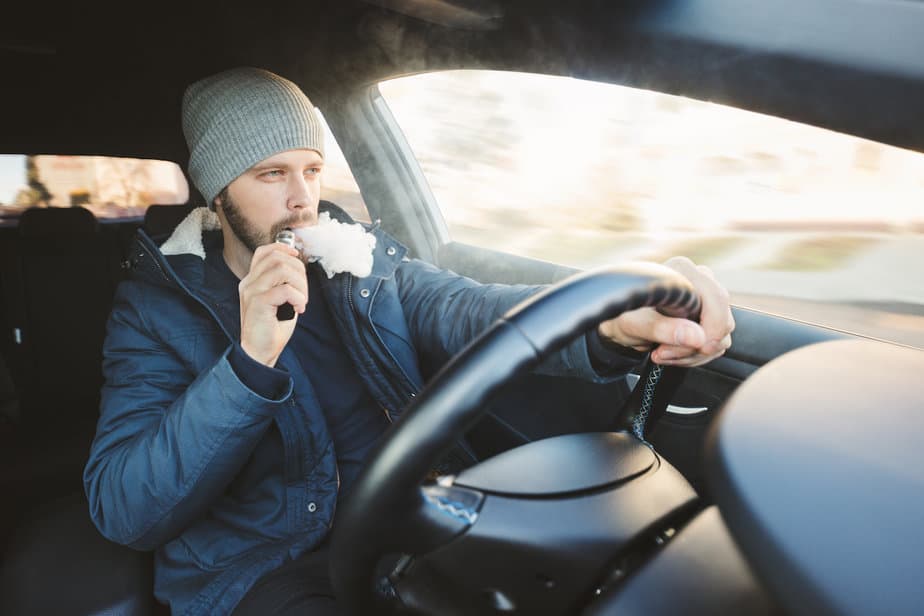Vaping and Driving: Here’s What You Need to Know

Vaping has come under increased scrutiny following the outbreak of a deadly lung disease that was linked to e-cigarettes and vaping products.
Although federal and state lawmakers have taken steps to ban the sale of certain vaping products, the same laws and insurance stipulations that apply to tobacco use continue to apply to vaping.
That includes the practice of vaping while driving.
Under U.S. law, it’s no more illegal to use a vape pen behind the wheel than it is to smoke a cigarette. And insurers are no more likely to exclude auto coverage for vape users than they are to exclude coverage for other smokers.
But there are laws that may affect how motorists use vaping and other tobacco products. That’s why motorist and vaping advocates are urging drivers to exercise common sense if they want to vape on the road.
What the Law Says About Vaping While Driving
Although there are no U.S. laws explicitly prohibiting vaping while driving, vape users must still consider existing laws on safety and distracted driving.
For example, several states have laws prohibiting windshield obstruction, meaning a police officer could cite someone for driving around with thick vapor clouds and the windows rolled up.
Some states also prohibit any kind of smoking while driving with children in the car. In California, drivers may face a $100 fine for smoking when minors are present in the vehicle.
Based on how they interpret certain laws, police officers may leverage these laws to target irresponsible vaping practices. For example, many states have passed laws that prohibit texting or the use of any kind of “portable electronic device” while driving. An e-cigarette could fall under that category.
“We have seen posts on social media from a couple of people who have been pulled over for using what an officer thought was a cell phone,” says Alex Clark, CEO of the Consumer Advocates for Smoke Free Alternatives Association.
Police in the U.K. have started citing obstruction and distraction laws to target motorists who vape, even though there are no specific laws that outlaw vaping while driving. British officers have warned that drivers could lose their license and face a £2,500 fine if found guilty of driving without due care and attention.
In the U.S., one of the most direct attempts to enact a vaping law targeting motorists came in 2019 from Massachusetts lawmakers, who were considering extending the state’s asset forfeiture laws to allow police to seize the car of anyone possessing untaxed e-cigarettes. State lawmakers shot down the proposal before the end of the year, but they did sign a law severely restricting flavored vape products.
“The state’s reaction to nicotine vapor products and the proposed, now enacted, legislation banning flavors is a prime example of otherwise progressive states opening up a new front in the failed war on drugs,” Clark says.
The Insurance Concerns of Vaping and Driving
Smoking of any kind can affect life insurance policies, but it’s unlikely for auto insurers to exclude vape users when writing a policy. Auto insurance policy rates are based mostly on liability risk and vehicle value, which means vaping shouldn’t present any issues.
U.K. insurers may be a little bit less forgiving, even though policies there do not directly contain exclusions for vaping. Some British insurers have been known to deny insurance payouts to motorists who have an accident while using a vaping device. The Royal Society for the Prevention of Accidents has described vaping at the wheel as a “growing and concerning trend” for road safety, and that it could constitute a careless driving offense.
Vaping Hazards to Avoid on the Road
Motorist advocates urge drivers to be aware of hazards and use their best judgment if they choose to vape.
“Everyone should think about what level of distraction they can handle when they drive,” says Sheila Dunn, spokeswoman for the National Motorists Association. “I need to concentrate very hard when I drive, but not everyone is like that.”
It may be tempting for drivers to take their eyes off the road to turn their attention to their vaping device. Clark says people should avoid using products like drip-style models that require frequent refilling of e-juice.
“Instead, vaping motorists are better off using closed pod- or cartridge-based products or open-tank systems that don’t require frequent refilling,” he says.
Clark says people who vape should store batteries in protective cases when not in use to avoid causing a fire. “Coins and random metal objects stored in cup holders and glove boxes don’t mix with exposed battery leads,” he says.
Visibility is another key concern, as certain types of e-juice contain a high level of vegetable glycerin, which produces thicker clouds than cigarettes. Drivers can greatly improve their visibility by keeping the windows open when blowing smoke. There are also newer varieties of e-juice that have been designed to produce very little water vapor, meaning clouds dissipate quickly.
For smokers of any kind, high levels of nicotine can cause dizziness and light-headedness that could lead to an accident. Taking shallower puffs can help keep this from happening.
By taking certain precautions behind the wheel, vape users can greatly reduce hazards – and potentially keep themselves out of the crosshairs of concerned lawmakers.
The NMA opposes stringent driving laws that don’t allow people to make decisions for themselves. But Dunn says that means it’s up to drivers to act responsibly and know their limits when it comes to vaping and driving.
“My suggestions is that if you don’t think you can do it, then don’t,” she says.
No matter how you choose to safely drive, you’ll need a great insurance policy to cover any potential risks of being on the road.
